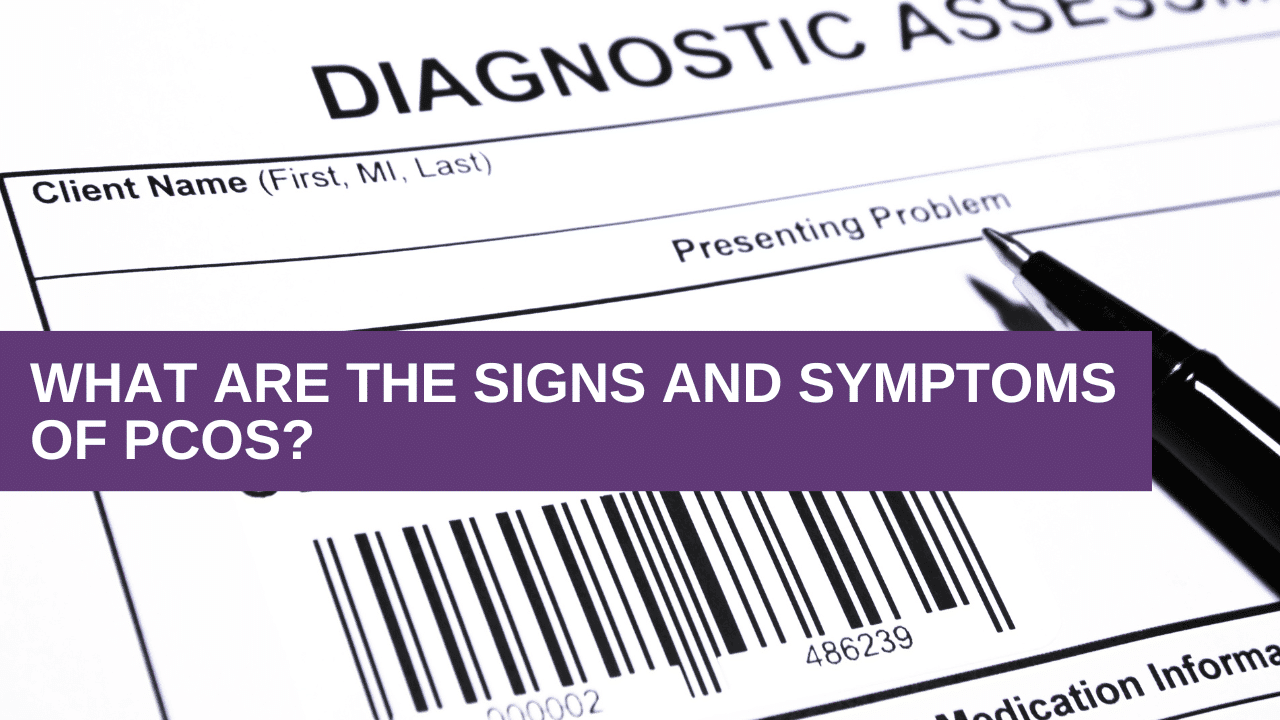Polycystic ovary syndrome or PCOS is a condition in young women in which they do not ovulate regularly and have high levels of male hormones in their systems. Signs and symptoms of PCOS are a little bit different. Signs are what medical providers perceive on your examination, in your bloodwork or imaging studies. While symptoms are what you experience.
The Symptoms of PCOS are:
- Irregular periods due to not producing enough progesterone
- Male-like body and facial hair, acne on chin, neck, shoulders or frontal hair loss
- Infertility due to infrequent ovulation
- Obesity with fat deposits mainly in your abdomen
- Sleep disturbances occur in half of PCOS women – because of an altered pattern of hypothalamic luteinizing hormone-releasing hormone (LHRH) and pituitary LH/FSH which affects your circadian rhythm.
Signs of PCOS are:
- Overweight/central obesity with visceral fat deposited in your internal organs seen on imaging studies
- Hirsutism – body and facial hair in male patterns, male pattern baldness
- In your blood:
- Elevated DHEA and testosterone
- Low SHBG (sex hormone binding globulin) which means too much testosterone is free to cause acne and hair growth
- Low mid-luteal phase progesterone
- High AMH – Anti-Müllerian hormone (AMH), also known as Müllerian inhibiting substance, is a type of hormone secreted by an ovarian follicle as it matures. AMH reflects your antral or resting follicles known as your ovarian reserve. Too much AMH can actually stop ovulation from occurring. In a normal ovary, AMH prevents the premature development of a follicle. When AMH levels are too high, it stops the maturation of an egg before it can ovulate.
- Elevated HGBA1C – indicating insulin resistance
- High blood pressure if PCOS has progressed to metabolic syndrome
- High cholesterol particularly high LDL and low HDL, plus high triglycerides
PCOS is believed to be multifactorial, partly genetic; however, we are not sure which genes are responsible.
Insulin resistance is not included in the diagnostic criteria but is consistently noted among many women with PCOS, especially in those with hyperandrogenism (too much male hormone). Now there is strong evidence that cardiovascular disease risk factors and disturbances in carbohydrate metabolism are all increased in patients with PCOS compared to the healthy population.
Not all women with polycystic ovary syndrome patients are overweight. But they can still be insulin resistant. And because polycystic ovary syndrome is a metabolic disorder, which means central obesity, high blood pressure, high triglycerides, high cholesterol and insulin resistance, you have an increased risk of developing heart disease and diabetes.
A diagnosis of PCOS is made when you have at least two of the following three signs:
1. Irregular periods or no periods
2. Higher levels of circulating androgens as shown by:
- a blood test, OR
- symptoms such as:
- excess facial or body hair growth
- scalp hair loss
- acne.
3. Polycystic ovaries are visible on an ultrasound, meaning:
- more than 20 follicles (partly developed eggs) are visible on one or both ovaries or the size of one or both ovaries is increased (more than 10ml).
You do not need to have an ultrasound if you have irregular periods and evidence of high androgens.
The best way to diagnose polycystic ovary syndrome is looking at bloodwork.
Women with polycystic ovary syndrome have elevation male hormones both testosterone and DHEA, and low sex hormone binding globulin which binds up testosterone so in PCOS there’s more free testosterone, contributing to the hairiness. Adrenal DHEA is elevated too. DHEA is an androgen, an anabolic hormone that tends to be high when you’re under stress, but it can be converted into testosterone and contribute to hirsutism, as well as weight gain.
PCOS seems to be becoming more of an issue in young women. While there’s a genetic component, lifestyle contributes to developing PCOS – high stress, too many carbs and sugar, not enough exercise.
PCOS is not necessarily a gynecological disorder.
It’s a metabolic disorder, which means that if you don’t get it under control, you’re more likely to develop issues with insulin resistance, type two diabetes, chronic obesity, heart disease or stroke.
That’s why it’s important that PCOS is diagnosed and treated as early as possible. Most of the treatments are lifestyle treatments. There are also medications used for PCOS but the best treatment is to balance out your hypothalamus because polycystic ovary syndrome is truly a symptom of hypothalamic dysfunction.
Support your hypothalamus and balance your hormones with Genesis Gold®.
If you want to learn more about PCOS, please join my free Hormone Reboot Training.



0 Comments